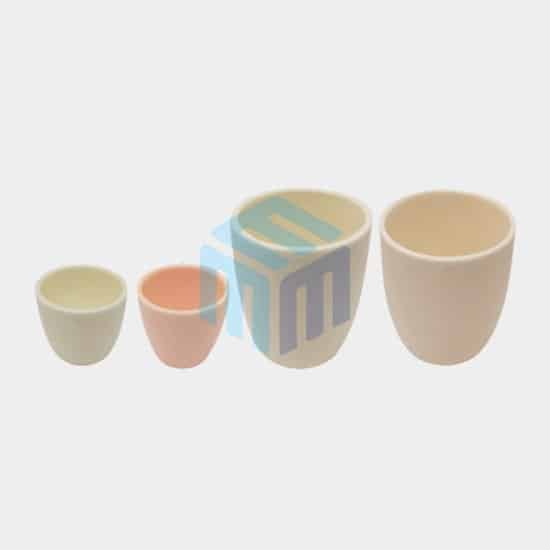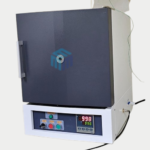Magnesia crucibles, made from magnesium oxide (MgO), offer several advantages in high-temperature laboratory settings, particularly in specialized applications where other materials may not perform as well.
Here are the key benefits of using magnesia crucibles in high-temperature laboratories:
- Exceptional High-Temperature Resistance
- Operating Temperatures: Magnesia crucibles can withstand temperatures up to 2,200°C, making them suitable for extremely high-temperature processes such as metal casting, sintering, and chemical synthesis.
- Melting Point: With a melting point of about 2,852°C, magnesia is highly stable at temperatures where other crucibles, like those made from alumina or quartz, would fail.
- Chemical Stability and Inertness
- Basic Nature: Magnesia is chemically basic, making it resistant to attack by most slags, metals, and fluxes. This makes it ideal for applications involving basic compounds or where a non-reactive environment is required.
- Resistance to Reactivity: Magnesia crucibles are less likely to react with basic or alkaline substances, ensuring that the crucible does not contaminate the sample or affect the outcome of high-temperature experiments.
- Low Reactivity with Metals
- Metal Processing: Magnesia crucibles are particularly advantageous for melting and processing reactive metals such as uranium, thorium, and titanium, where contamination must be minimized. Their low reactivity prevents unwanted chemical interactions with these metals.
- Excellent Thermal Insulation
- Thermal Conductivity: Magnesia has a relatively low thermal conductivity, which helps maintain temperature uniformity within the crucible. This is beneficial for processes requiring precise temperature control and even heating.
- Energy Efficiency: The insulating properties of magnesia crucibles can reduce energy consumption in high-temperature processes by minimizing heat loss.
- High Purity and Low Contamination
- Purity Levels: Magnesia crucibles can be produced with very high purity, often above 99.5%, ensuring minimal contamination of samples. This is crucial in sensitive applications such as materials research, analytical chemistry, and the production of high-purity compounds.
- Analytical Applications: The high purity of magnesia crucibles makes them suitable for trace analysis and other analytical techniques where even minimal contamination could skew results.
- Durability and Mechanical Strength
- Thermal Shock Resistance: Magnesia crucibles exhibit good thermal shock resistance, which is essential in processes that involve rapid heating and cooling cycles.
- Mechanical Stability: Despite being somewhat more brittle than alumina, magnesia crucibles offer adequate mechanical strength for many high-temperature applications.
- Specific Suitability for Oxide and Non-Oxide Ceramics
- Ceramic Processing: Magnesia crucibles are ideal for the synthesis and processing of oxide ceramics and some non-oxide ceramics. They can tolerate the harsh conditions of ceramic firing, where other materials might degrade.
- Cost-Effectiveness
- Relative Affordability: While magnesia crucibles can be more expensive than quartz or alumina crucibles, their performance in specific high-temperature applications justifies the cost, especially when the crucible’s longevity and the quality of the results are considered.
- Compatibility with Reducing and Oxidizing Atmospheres
- Versatility: Magnesia crucibles can be used in both reducing and oxidizing atmospheres, making them versatile for various high-temperature laboratory processes. This is particularly beneficial in research and industrial applications that require flexibility in atmosphere control.
- Environmental Considerations
- Reusability: Magnesia crucibles can often be reused multiple times, depending on the specific application and handling. Their durability contributes to lower waste generation in the laboratory.
Summary
Magnesia crucibles are an excellent choice for high-temperature laboratories due to their exceptional thermal stability, chemical inertness, and suitability for specialized applications such as metal processing and ceramic synthesis. Their ability to withstand extremely high temperatures, combined with their low reactivity with metals and chemicals, makes them a preferred option in environments where purity, durability, and performance are critical. Although they may be more costly than some other types of crucibles, their benefits often outweigh the initial investment, particularly in demanding laboratory settings.
M-Kube Enterprise is a USA company catering customized laboratory products, laboratory consumables, and laboratory solutions in the USA, India, Australia, New Zealand, Singapore, Malaysia, South Korea, Dubai, the Philippines, Indonesia, and Vietnam.






